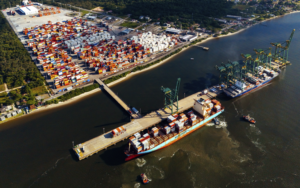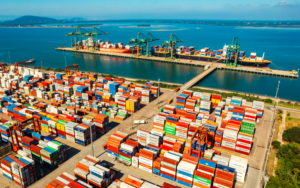Work on the Portonave docking berths, in Navegantes, to receive 400-meter-long ships (the new generation of commercial vessels) and the uncertain scenario of resuming cargo operations at the Port of Itajaí have caused an unprecedented logistical challenge in Santa Catarina since the beginning of 2024. The consequences are already affecting the entire infrastructure of the Southern region, with direct impacts on the economy and companies’ competitiveness.
The situation has had negative effects even on the Port of Santos, the largest in Latin America, worsened by an incident at one of the berths of Brasil Terminal Portuário (BTP). Delays for berthing at the Santos terminal have ranged from 3 to 4 days and the repair forecast is estimated to take up to 10 months and further affects the operations and capacity of ports in the South region.

Ripple effect in the South and Southeast
Other parallel factors generate a ripple effect on the infrastructure of the South and Southeast. Operating at 105% of the yard’s capacity, the Port of Itapoá (SC) also faces problems in releasing cargo with the Ministry of Agriculture and Livestock (Mapa), delaying the flow of the impounded volume. The Port of Paranaguá (PR), in turn, is at the limit of space available for storing containerized cargo, in addition to having less availability of 40-foot equipment. In the Southeast, the Port of Vitória suffers from a shortage of 20-foot containers for dry cargo.
>>> Step by step to import: how you can purchase products from other countries
With so many associated factors, including missed ship calls, congestion at ports that cause delays in operations and difficulties in meeting deadlines, and inevitably trigger challenges in the logistics market. However, it is important to highlight that the logistical chaos had its “trigger” in the pandemic, when there were rules for ships to be able to dock due to quarantine, which strongly impacted the flow of loading and unloading operations.
Port of Itajaí: inactivity harms the flow
Furthermore, the inoperability of the Port of Itajaí worsens the logistical chaos in Santa Catarina, negatively impacting the region’s economy. Resolving this crisis will require a joint effort between the new operator, the government and the other sectors involved to find viable solutions that allow port activities to resume as quickly as possible.
The lack of activity in Itajaí has caused many shipowners to stop operating in the port complex, further reducing cargo flow capacity. The demand for services has been transferred to other ports in the region, such as Itapoá and Paranaguá, which were already operating at maximum capacity, resulting in congestion and delays in operations.
Eduarda Tajiri Marques, sea export product supervisor at Grupo Allog, says that diverting routes can generate additional costs for transport and logistics companies, further increasing the complexity of the logistics scenario. Congestion also usually generates additional storage, demurrage, and freight costs.

How to deal with the situation?
According to Allog Group’s employee, to face this challenge, a joint effort is needed from all involved sectors. Efficient cargo flow management, the search for alternative routes, negotiation with port terminals and regulatory authorities and collaboration between companies, government and consenting bodies are essential measures to minimize the negative impacts of logistical chaos.
Eduarda highlights that, despite the current challenges, investments in port infrastructure such as those made at Portonave are essential to ensure the competitiveness of Santa Catarina’s logistics chain in the long term. Furthermore, the modernization and expansion of the State’s ports will be essential to meet the growing demand for sea transport and ensure the region’s economic development.



